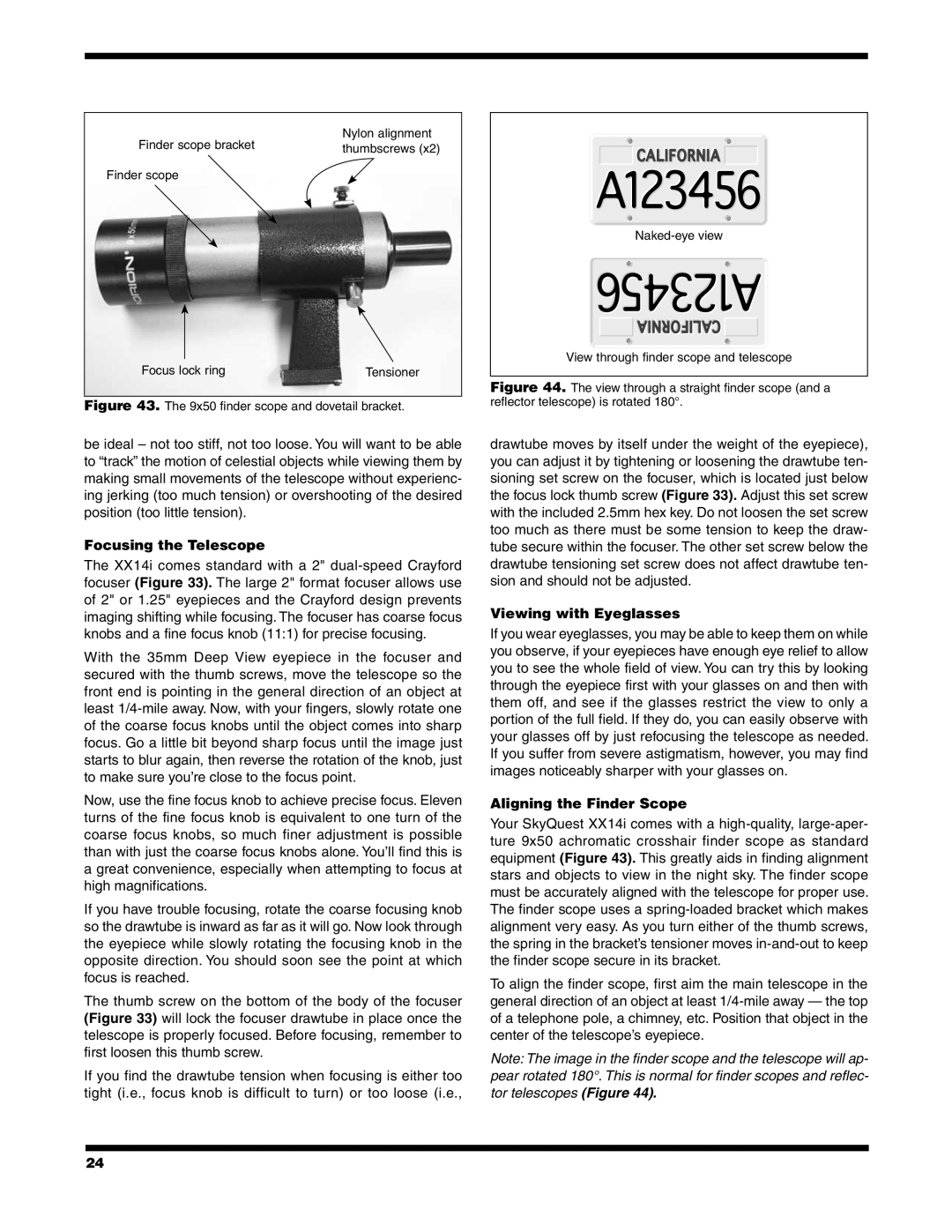
Nylon alignment
Finder scope bracket | thumbscrews (x2) |
| |
Finder scope |
|
Focus lock ring | Tensioner |
Figure 43. The 9x50 finder scope and dovetail bracket.
be ideal – not too stiff, not too loose. You will want to be able to “track” the motion of celestial objects while viewing them by making small movements of the telescope without experienc- ing jerking (too much tension) or overshooting of the desired position (too little tension).
Focusing the Telescope
The XX14i comes standard with a 2"
With the 35mm Deep View eyepiece in the focuser and secured with the thumb screws, move the telescope so the front end is pointing in the general direction of an object at least
Now, use the fine focus knob to achieve precise focus. Eleven turns of the fine focus knob is equivalent to one turn of the coarse focus knobs, so much finer adjustment is possible than with just the coarse focus knobs alone. You’ll find this is a great convenience, especially when attempting to focus at high magnifications.
If you have trouble focusing, rotate the coarse focusing knob so the drawtube is inward as far as it will go. Now look through the eyepiece while slowly rotating the focusing knob in the opposite direction. You should soon see the point at which focus is reached.
The thumb screw on the bottom of the body of the focuser (Figure 33) will lock the focuser drawtube in place once the telescope is properly focused. Before focusing, remember to first loosen this thumb screw.
If you find the drawtube tension when focusing is either too tight (i.e., focus knob is difficult to turn) or too loose (i.e.,
View through finder scope and telescope
Figure 44. The view through a straight finder scope (and a reflector telescope) is rotated 180°.
drawtube moves by itself under the weight of the eyepiece), you can adjust it by tightening or loosening the drawtube ten- sioning set screw on the focuser, which is located just below the focus lock thumb screw (Figure 33). Adjust this set screw with the included 2.5mm hex key. Do not loosen the set screw too much as there must be some tension to keep the draw- tube secure within the focuser. The other set screw below the drawtube tensioning set screw does not affect drawtube ten- sion and should not be adjusted.
Viewing with Eyeglasses
If you wear eyeglasses, you may be able to keep them on while you observe, if your eyepieces have enough eye relief to allow you to see the whole field of view. You can try this by looking through the eyepiece first with your glasses on and then with them off, and see if the glasses restrict the view to only a portion of the full field. If they do, you can easily observe with your glasses off by just refocusing the telescope as needed. If you suffer from severe astigmatism, however, you may find images noticeably sharper with your glasses on.
Aligning the Finder Scope
Your SkyQuest XX14i comes with a
To align the finder scope, first aim the main telescope in the general direction of an object at least
Note: The image in the finder scope and the telescope will ap- pear rotated 180°. This is normal for finder scopes and reflec- tor telescopes (Figure 44).
24
